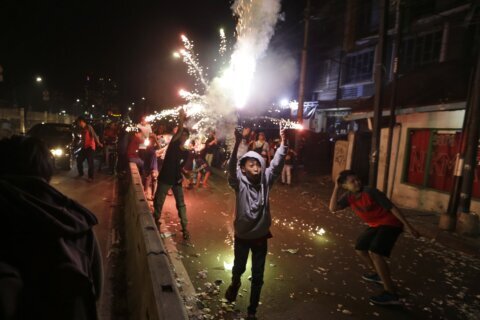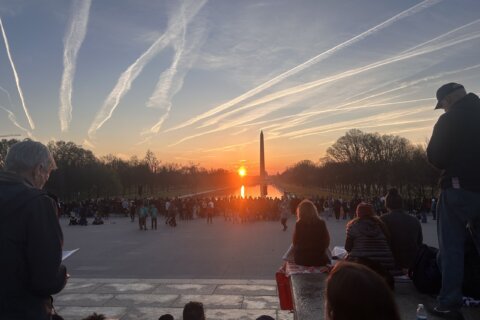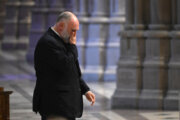Timeline of the National Basketball Association during the 1970s. The timeline includes milestone moments in the league’s history and key moments off the court as the NBA celebrates its 75th season:
April 29, 1970: Jerry West forces overtime in Game 3 of the NBA Finals, knocking down a 60-footer that ties the game for the Lakers in Los Angeles at 102. Dave DeBusschere was under the basket as the ball through the hoop, a shot that taken after the creation of the 3-point line would have won the game for the Lakers. Instead, the Knicks won 111-108 in overtime to take a 2-1 lead.
May 4, 1970: Four students are killed and nine wounded at Kent State by National Guard troops during a protest against expanding the Vietnam War and the presence of guard troops on campus.
May 8, 1970: The Willis Reed Game. The captain of the New York Knicks appeared to be sidelined by a badly bruised right hip that kept him out of Game 6, a win by the Lakers that forced a seventh game. The NBA MVP limped onto the court at Madison Square Garden, outjumped Wilt Chamberlain for the opening tip and scored the first basket from the top of the key. Reed hit another jumper but didn’t score again in 27 minutes. He had done enough as the Knicks clinched the title with a 113-99 win in Game 7.
March 1, 1971: Spencer Haywood wins a stay from the Supreme Court allowing him to play in the NBA less than four years after graduating high school. He had played a season in the ABA and 21 games into the 1970-71 season for the Seattle SuperSonics when the ruling came down. The NBA and Haywood’s attorney settled out of court with the hardship rule allowing players to skip college straight to the league out of high school.
July 1, 1971: The 26th Amendment is ratified, expanding the right to vote to everyone 18 and older. The amendment was proposed by Congress on March 23, 1971, and quickly had support from three-fourths of the states.
Nov. 5, 1971: The Los Angeles Lakers start an NBA-record 33-game winning streak at home beating the Baltimore Bullets 110-106. During the streak, the Lakers topped the previous longest winning streak in major league sports when they beat the Bullets again on Dec. 22 for their 27th straight win, eclipsing the 26 straight games won by the 1916 New York Giants in Major League Baseball. Their 33rd consecutive win comes Jan. 7, 1972 with a 134-90 win in Atlanta over the Hawks.
Jan. 9, 1972: The Lakers’ record 33-game winning streak ends with a 120-104 road loss to the Bucks in Milwaukee.
May 7, 1972: The Lakers win the NBA Finals 4-1 over the Milwaukee Bucks for the franchise’s first title since relocating from Minneapolis to Los Angeles in 1960. They clinch the championship in Los Angeles with a 114-100 win with Wilt Chamberlain and Jerry West starting and future Lakers coach Pat Riley coming off the bench.
June 17, 1972: Five men are arrested after a break-in of the Democratic National Committee headquarters in Washington, D.C. at the Watergate Office Building. Cash found on the men at the time is connected to the committee to re-elect President Nixon.
Dec. 11, 1972: Apollo 17 becomes the last mission of NASA’s Apollo program to touch down on the moon and last time humans set foot on the moon. Eugene Cernan and Harrison Schmitt lift off on Dec. 14 for the return home.
Jan. 22, 1973: The Supreme Court ruling in Roe v. Wade protects a woman’s right to abortion in a 7-2 decision under the 14th Amendment to the U.S. Constitution and the due process clause providing a right to privacy.
Oct. 17, 1973: The oil crisis begins when the Organization of Arab Petroleum Exporting Countries start an oil embargo that lasts until March 1974 against countries that supported Israel during the Yom Kippur War. The price of oil per barrel goes from approximately $3 to nearly $12, leading to gas lines as the price per gallon nearly doubled and President Nixon asked gas stations not to sell gas on Saturday nights or Sundays. A national speed limit of 55 was instituted.
Jan. 6, 1974: Year-round daylight saving time starts as a response to the oil crisis and lasts to Oct. 27, 1975, with a break between Oct. 27 and Feb. 23. It ends in 1976.
April 8, 1974: Hank Aaron hits the 715th home run of his career in the fourth inning off Al Downing of the Los Angeles Dodgers, setting the record for Major League Baseball and topping the previous mark set by Babe Ruth following months of death threats.
May 10, 1974: Kareem Abdul-Jabbar forces the NBA Finals to a seventh game with his skyhook for a 102-101 win in double overtime over the Celtics in Boston. John Havlicek forced the first overtime with a long jumper, and his putback of his miss pushed the game to a second OT. Havlicek hit a jumper over Abdul-Jabbar with seven seconds remaining for a 101-100 lead. Abdul-Jabbar finished off the win from the baseline.
May 12, 1974: The Boston Celtics win their 12th NBA championship with a 102-87 victory over Milwaukee in Game 7. Dave Cowens scores 28 points and grabs 14 rebounds, outscoring Kareem Abdul-Jabbar.
Aug: 9, 1974: President Richard Nixon becomes the first U.S. president to resign after the House Judiciary Committee approved three articles of impeachment over the Watergate scandal. Gerald Ford, appointed vice president on Dec. 6, 1973, becomes president.
Sept. 8, 1974: President Gerald Ford grants Nixon a complete and unconditional pardon.
Oct. 18, 1974: Moses Malone becomes the first to go from high school to the pros, making his debut scoring 19 points with 11 rebounds in Utah’s 105-89 loss to the New York Nets in the ABA. Utah selected Malone in the third round of the ABA draft.
April 4, 1975: Bill Gates and Paul Allen start Microsoft in Albuquerque, New Mexico.
April 30, 1975: The fall of Saigon marks the end of the Vietnam War more than two years after U.S. ground troops left South Vietnam. Operation Frequent Wind evacuates most of the remaining American civilians and military personnel in addition to thousands of South Vietnamese.
May 29, 1975: Darryl Dawkins and Bill Willoughby become the first high school players selected in the NBA draft. Dawkins is the fifth pick overall by Philadelphia, and Willoughby is the first pick at the start of the second round, No. 19 overall, by Atlanta.
Jan. 27, 1976: Julius Erving of the New York Nets won the ABA slam dunk contest, highlighted by his famous free-throw line jam. He beat Denver’s David Thompson, Kentucky’s Artis Gilmore and San Antonio’s George Gervin and Larry Kenon. The NBA adopted the Slam Dunk Contest and added it to its All-Star festivities in 1984.
April 1, 1976: College dropouts Steve Jobs and Steve Wozniak start Apple Computers, Inc. in Los Altos, California.
June 4, 1976: The NBA’s first triple overtime game in the NBA Finals. The Boston Celtics and Phoenix Suns were tied at 95 after regulation and at 101 after the first overtime when referee Richie Powers ignored Paul Silas trying to call a Boston timeout, which would have given the Suns a chance to win on a technical foul. In the second OT, fans ran onto the court at the Boston Garden after John Havlicek banked in a 15-footer. Gar Heard beat the buzzer with a jumper forcing the third OT. Glen Donald and JoJo White each score six points in the third OT to help the Celtics pull out a 128-126 win and a 3-2 series lead.
June 6, 1976: The Boston Celtics win their 13th NBA championship with an 87-80 victory in Phoenix.
July 4, 1976: The United States celebrates the country’s Bicentennial.
Jan. 23, 1977: The miniseries “Roots” debuts on ABC based on a book by Alex Haley and runs through Jan. 30 attracting record ratings, with the finale drawing a 71% share of the TV audience. The story follows the path of Kunta Kinte from his childhood and capture in The Gambia, West Africa, to his life as a slave in colonial America. It also follows his escape attempts and the lives of his descendants.
Aug. 16, 1977: Elvis Presley dies at his Graceland home in Memphis at the age of 42.
Sept. 1977: Atari 2600, the first home video game console, is released.
Dec. 9, 1977: Kermit Washington of the Los Angeles Lakers punches Rudy Tomjanovich of the Houston Rockets during a scuffle. Washington, a 6-foot-8, 230-pound forward, saw Tomjanovich approach out of the corner of his eye, turned and threw a nasty right that shattered Tomjanovich’s face and nearly killed him. After several surgeries, Tomjanovich made a full recovery, was an All-Star in 1979 and won two NBA titles as the Rockets’ head coach in 1994 and 1995. Washington was fined $10,000 and suspended 60 days.
April 9, 1978: David Thompson of the Denver Nuggets and George “The Iceman” Gervin duel down to the final day of the regular season for the scoring title. Thompson scores 73 points in a loss to Detroit, making 28 of 38 shots. He set the NBA scoring mark with 32 points in the first quarter, topping Wilt Chamberlain’s mark of 31 in his 100-point game. That night Gervin needed 59 points for the title. He scores 53 by halftime and finishes with 63 for San Antonio in a loss to New Orleans. Gervin also scored 33 in the second quarter, topping Thompson’s mark seven hours later.
1978: Bill Walton wins the MVP award, despite playing in just 58 of his team’s 82 regular-season games. Before he suffered a left foot injury, the Trail Blazers were 50-10 as Walton averaged 18.9 points, 13.2 rebounds, 5.0 assists and 2.5 blocks. Portland went 8-14 the rest of the regular season. The Trail Blazers lost in the first round of the playoffs after Walton attempted a comeback and got injured again. He never played for Portland again.
March 28, 1979: A partial meltdown of the Three Mile Island Unit 2 reactor begins, the biggest accident at a U.S. commercial nuclear power plant. The accident exposed nearly 2 million people to radiation with Pennsylvania officials tracking more than 30,000 who live within five miles of the reactor at the time of the accident until 1997.
Sept. 16, 1979: The Sugarhill Gang releases Rapper’s Delight, considered the first major hip hop hit.
Nov. 4, 1979: Iranian college students supporting the Iranian Revolution take over the U.S. Embassy in Tehran and seize 52 U.S. diplomats and citizens. They are held hostage for 444 days before being released Jan. 20, 1981.
___
More on the NBA At 75: https://apnews.com/hub/nba-at-75
___
More AP NBA: https://apnews.com/hub/NBA and https://twitter.com/AP_Sports
Copyright © 2024 The Associated Press. All rights reserved. This material may not be published, broadcast, written or redistributed.







